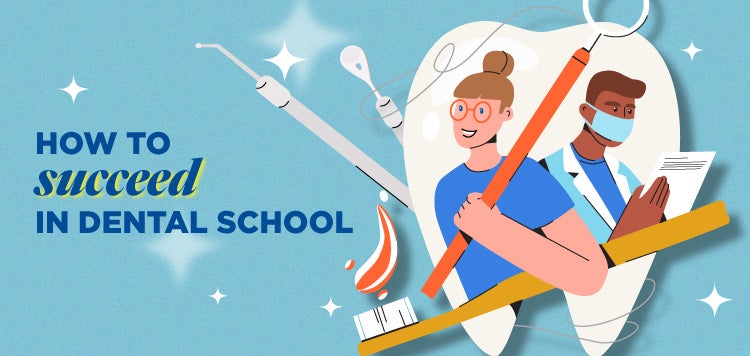
So, you've done it. You have enrolled in dental school. Now, all that is left to do is be successful.
But how does one do that, exactly? Which classes should you expect, and what do first-year dental students do? How much studying is enough? And is there such a thing as "enough" studying?
We have some suggestions. From how to prepare for dental school to study tips for dental students to how to achieve a work-life balance; we have tips for dental students to be successful in dental school.

Setting the Proper Expectations is a Great Start
Dental school is almost always four years long, although there are a couple of exceptions. The first couple years of dental school delve deeper into the sciences, including classes on oral anatomy, pathology, and histology, while the second two focus on clinical skills. [1]
So, if you don't have a strong background in science from your undergraduate years, you may find the first year of dental school hard. Also, you will probably study—a lot.
However, don't let that scare you off. Most dental students say that the workload is manageable. The coursework is challenging and requires discipline regarding studying, but most dental students handle it just fine.
The daily life of a dental student is relatively routine. Classes are from 8 am to 4 pm, with an hour off for lunch. Different days have different classes and focus. Some might be a deeper take on the science classes you had in undergrad, and others might be hands-on work in dental-specific activities, like making teeth out of wax, charting patient information, or how to clean teeth.
Studying, in addition to course and lab work, is a large part of every dental student’s day. Some estimates put it at four to six hours every day. [2] How much you study could also depend on the style of dental school that you attend. Some schools are more lecture based and require more outside of class study; others are not. [3] A good rule of thumb for studying in dental school is to schedule it every day for several hours. Consistency and discipline are the key to success. [4]
Prepare for Dental School Before You Arrive
It's a good idea to get ready for dental school before you get there on day one. But does that mean we think you should take a biochemistry course or work as a dental assistant all summer? Not necessarily, although neither of these things would hurt.
However, if you want to take a different route into dental school, here are a few suggestions from the American Dental Education Association (ADEA): [5]
- Go to the orientation. If your dental school has one, go to it. This event will help you set more realistic expectations specific to your program.
- Fix your finances. Dental school is costly, so get your finances settled before you get to school and have other things to worry about.
- Work on your critical dental student skills. Two things are imperative for the dental student's success: excellent (and speedy) reading comprehension and competent hand dexterity. So, read anything you can get your hands on with a focus on retention and keep up your hand-skill work, whether playing the piano or knitting a scarf. Both of these areas will serve you throughout your dental school career.
- Invest in healthy habits. Dental school is physically and mentally taxing. Developing healthy habits that support your student efforts will deliver the best possible version of yourself, one that is capable of accepting these challenges. Improve your eating habits, exercise regularly, and practice self-care to prepare for what is coming.
- Relax. It's a good idea to take a break and enjoy some time doing what you love before you start school. Then, begin the new term fresh and rested to get dental school off to a great start.
Develop These Three Skills for Success Before and After Graduation
In addition to reading comprehension and hand skills, there are three essential skills every dentist—and dental student—needs. These include: [6]
- Effective Communication Skills. These skills are helpful in every aspect of your life, and dental school or dental practice is no exception. The ability to express your ideas or concerns professionally is critical. Also, building relationships with peers and instructors is excellent training for managing a team and connecting with patients. Remember, listening and following are as crucial to success as leading and directing.
- Excellent time management skills. Procrastination has no place in a dental practice or the dental school classroom. The most successful dentists have a proactive approach to their studies as dental students. Waiting until the last minute to cram for an exam or start a paper is not a path to success in dental school. Regular study and time management is the key to dental student success.
- Consistently open to learning. Dentistry is a profession of continual learning. Techniques and materials change all the time, improving patient experiences and outcomes as they do. This approach to your career starts as a dental school student. Being open to new things and embracing change are hallmarks of being a successful dental student.

The First Year Requires Balance, Engagement, and Studying
Many first-year dental students wonder how they will survive the first year. However, the University of Illinois, Chicago, recommends getting involved with student organizations, networking with older students, and having a study strategy that you stick to and that works for you. In addition, keeping a balance between school and personal time is also essential. [7]
Attaining balance isn't as cut and dried as the other ones. It requires a deliberate effort not to study. Which it feels counterintuitive at such an important time in your student career.
So, how can a dental student balance school and personal time? One dental student in the UK had a few suggestions. Many dental student applicants have extracurricular activities they did before dental school, which is why the admissions team chose the student. These "other than dental" activities are essential. Having a break from dental is crucial to keep your time spent on dental more focused and productive. So, whether it's exercise or a sport, painting, or some other expression of art, or playing the guitar in a cover band, keep up those activities to maintain a balance between the dental you and the rest-of-your-life you. [8]
Study Tips That Work for Some and Might Work for You, Too
There is no getting around it. Studying is a key part of being a dental student. But what are the best ways to learn, and what should you do to establish your system?
These questions might have different answers depending on who you are. Every dental student needs to understand their learning style. Maybe you do better in the morning or right after class. Music might enhance your learning experience. Perhaps you like to have a study group that works together to learn. You likely know what works well for you at this point in your academic career. Here are a few more helpful suggestions: [9]
- Take notes, notes, and more notes. Notes are essential in dental school. They not only increase your focus, but they also help you remember what you learned later. Plus, to take them, you have to be in class, so there's that benefit, too. ASDA says handwriting is the most effective, but Word or Google Docs is good too, and with Docs, you can share and collaborate with your classmates.
- Find a study environment you like. Make sure it's comfortable for you and free from distractions. And don't be afraid to use focus settings on your devices.
- Take breaks. Managing stress is a critical part of studying. You can't retain things when stressed, so trying to learn when you feel that way is a waste of time. So, schedule breaks and lean into them. This skill will serve you later when you practice as well.
- Be consistent. A regular study schedule will serve you better than an all-nighter. There is too much information, and it is vital for your career to have full command of it. Therefore, learn it over time, at the same time, so you know it all the time.

Dental school is a challenging but rewarding time. Sure, there is a lot to study and remember, but it is also a time when you make connections in your chosen career. It's when you make friends with other like-minded dental professionals. It's when you share learning experiences that you will remember throughout your career. So, follow the advice you read here, the counsel you get from your support network, and that instinct in your gut, and you'll have a successful dental school experience that predicates a successful dental career.
If you're a dentist or aspiring to become one, let's talk about joining our team.
Sources:
[1] Dental school curriculum. Adea.org. https://www.adea.org/GoDental/Future_Dentists/Dental_school_curriculum.aspx. Accessed October 28, 2022.
[2] Being Successful Once Enrolled in Dental School (2023). Available at: https://www.adea.org/GoDental/Dental_Blogs/Advice_from_admissions_officers/Being_Successful_Once_Enrolled_in_Dental_School.aspx (Accessed: 7 February 2023).
[3] Dental school curriculum (2023). Available at: https://www.adea.org/GoDental/Future_Dentists/Dental_school_curriculum.aspx (Accessed: 7 February 2023).
[4] What is dental school like? • Become A Dentist (2023). Available at: https://becomeadentist.org/what-is-dental-school-like/ (Accessed: 7 February 2023).
[5] Tips for Preparing to Enter Dental School(no date)adea.org. American Dental Education Association. Available at: https://www.adea.org/GoDental/Future_Dentists/Tips_for_preparing_to_enter_dental_school.aspx (Accessed: October 28, 2022).
[6] Foster, D (2017)Being Successful Once Enrolled in Dental School,www.adea.org. American Dental Education Association. Available at: https://www.adea.org/GoDental/Dental_Blogs/Advice_from_admissions_officers/Being_Successful_Once_Enrolled_in_Dental_School.aspx (Accessed: October 28, 2022).
[7] 5 Tips for a Successful First Year in Dental School | College of Dentistry | University of Illinois Chicago. Dentistry.uic.edu. https://dentistry.uic.edu/news-stories/5-tips-for-a-successful-first-year-in-dental-school/. Published 2018. Accessed October 28, 2022.
[8] Dariush, A. (2020)10 tips for surviving the 1st year of Dental School – Student blog,Blog.dundee.ac.uk. University of Dundee. Available at: https://blog.dundee.ac.uk/studentblog/2020/05/27/tips-on-surviving-the-1st-year-of-dental-school/ (Accessed: October 28, 2022).
[9] Zeng, B. (2021)5 study tips for Dental students,PONBEE.com. PONBEE. Available at: https://ponbee.com/tips-for-dental-students/ (Accessed: October 28, 2022).
The information provided by Pacific Dental Services in this blog is intended to educate readers about oral health and related topics. However, it is not a substitute for professional advice or career guidance from a qualified dental professional or educator. It is important to seek the help of experts for any concerns related to oral health or career planning.



